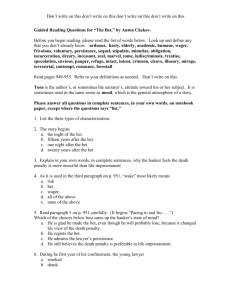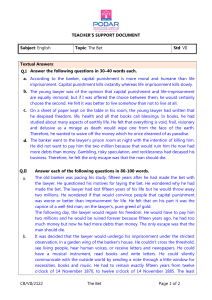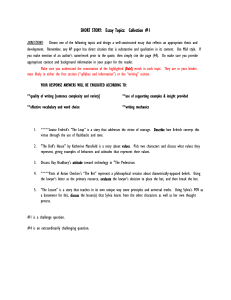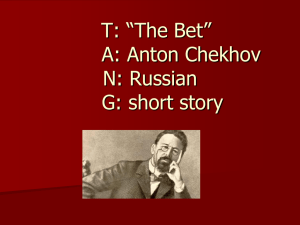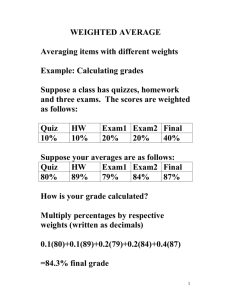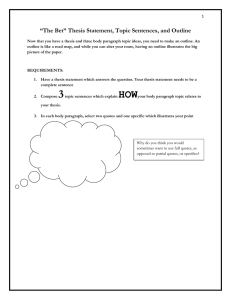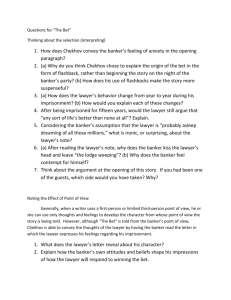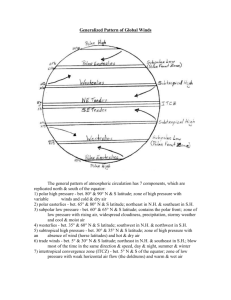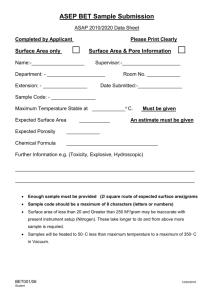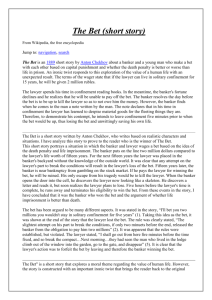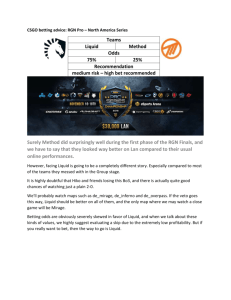Bet - Union County Vocational
advertisement
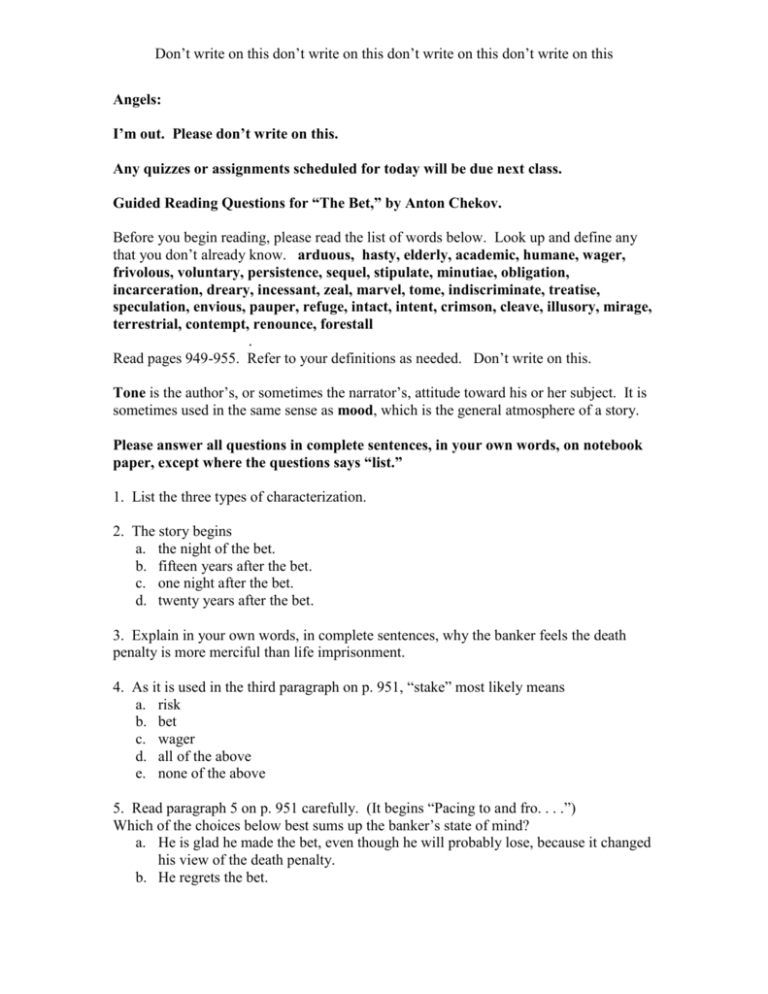
Don’t write on this don’t write on this don’t write on this don’t write on this Angels: I’m out. Please don’t write on this. Any quizzes or assignments scheduled for today will be due next class. Guided Reading Questions for “The Bet,” by Anton Chekov. Before you begin reading, please read the list of words below. Look up and define any that you don’t already know. arduous, hasty, elderly, academic, humane, wager, frivolous, voluntary, persistence, sequel, stipulate, minutiae, obligation, incarceration, dreary, incessant, zeal, marvel, tome, indiscriminate, treatise, speculation, envious, pauper, refuge, intact, intent, crimson, cleave, illusory, mirage, terrestrial, contempt, renounce, forestall . Read pages 949-955. Refer to your definitions as needed. Don’t write on this. Tone is the author’s, or sometimes the narrator’s, attitude toward his or her subject. It is sometimes used in the same sense as mood, which is the general atmosphere of a story. Please answer all questions in complete sentences, in your own words, on notebook paper, except where the questions says “list.” 1. List the three types of characterization. 2. The story begins a. the night of the bet. b. fifteen years after the bet. c. one night after the bet. d. twenty years after the bet. 3. Explain in your own words, in complete sentences, why the banker feels the death penalty is more merciful than life imprisonment. 4. As it is used in the third paragraph on p. 951, “stake” most likely means a. risk b. bet c. wager d. all of the above e. none of the above 5. Read paragraph 5 on p. 951 carefully. (It begins “Pacing to and fro. . . .”) Which of the choices below best sums up the banker’s state of mind? a. He is glad he made the bet, even though he will probably lose, because it changed his view of the death penalty. b. He regrets the bet. Don’t write on this don’t write on this don’t write on this don’t write on this c. He admires the lawyer’s persistence. d. He still believes the death penalty is preferable to life imprisonment. 6. During he first year of his confinement, the young lawyer a. smoked b. drank c. played the piano d. all of the above e. none of the above 7. What changes in the second year of the lawyer’s imprisonment? a. he smokes incessantly b. he drinks more c. he reads more serious books d. he stops playing the piano e. both c and d 8. After the tenth year the lawyer shows an interest in a. languages b. music c. philosophy d. religion e. both b and d 9. Which of the phrases below reflects the mood of Part II? a. Three o’clock struck. . . . b. The man was obviously sheltering from the weather. . . . c. He found the steps to the lodge and the door by feeling in the dark. . . . d. A keen, damp wind swooped howling round the whole garden, giving the trees no rest. 10. The way it is used in the second column on 954, “strains” most likely means a. tensions b. melodies c. smoke d. flames 11. How much of this story is told in flashback? a. All of it b. Part II only c. Part I, except for the first paragraph and one sentence on p. 951 d. The first two columns on 950 12. Hyperbole is a. using words to create sense impressions b. giving human qualities to inanimate objects Don’t write on this don’t write on this don’t write on this don’t write on this c. repetition of initial consonant sounds d. exaggeration for effect 13. Setting, the time and location in which plot events take place, often plays a crucial role in a story. Chekhov’s story is set in Russia. How important is setting to this story? Is it essential that it takes place in Russia in the 1800’s? Why or why not? Please answer in two to four complete sentences. 14. In your own words, in a sentence or two, explain the conflict for the banker in Part II of the story. 15. The banker has mixed feelings after reading the lawyer’s letter. He feels ashamed and agitated, but has he changed? Explain in a complete sentence or two, citing at least one specific example from the story. 16. In a well-organized paragraph of six to ten carefully constructed sentences, discuss your reaction to the views expressed in the lawyer’s letter. Do you agree or disagree with his view of the world? How do his views after fifteen years of confinement compare to his views at the time of the bet? Is he a better person for having spent fifteen years in solitude? Please include at least three specific examples from the story in your response. When you are finished, please return this paper and your answers to the sub.
